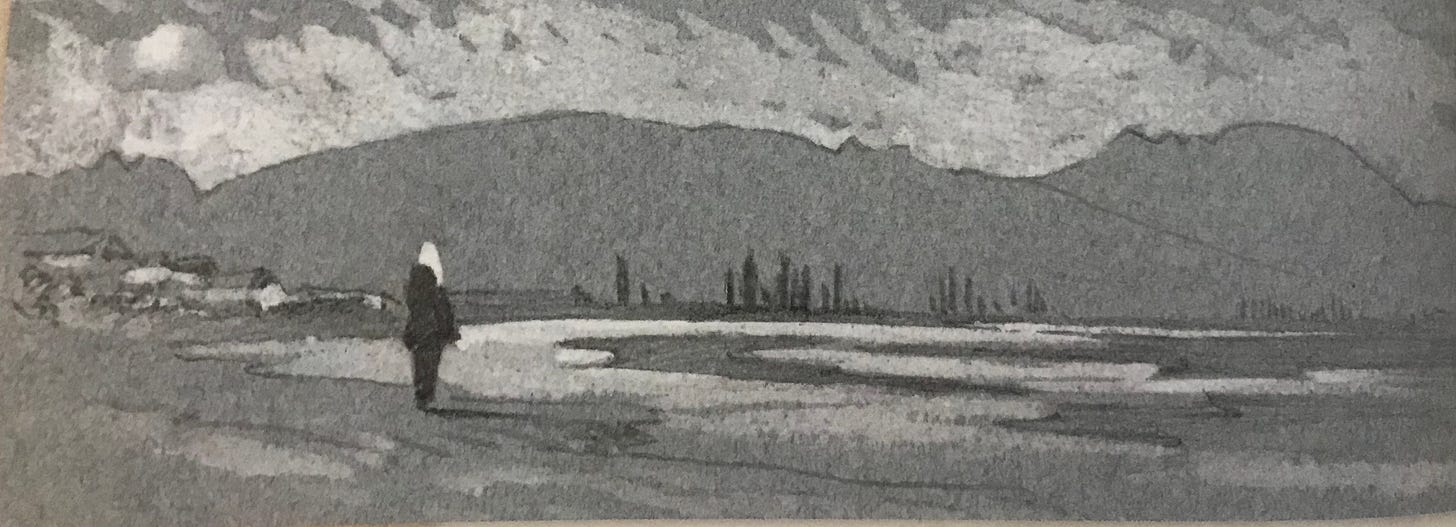
Dear reader,
This week has been a rainy one in Melbourne. The first morning that we woke up to the rain, after a warm and sunny weekend, the grief and grumpiness made for a miserable start to the day. I wasn’t bothered too much: my work and chores don’t usually depend on the weather (which maybe means I don’t pay enough attention to my garden…), and a rainy day leaves me less frustrated that I’m on Zoom instead of outside. But my children depend on the nice weather to see their friends at the playground, given our current state restrictions. The weather forecast, along with a return to school after the spring holidays, and lingering grogginess from Daylight Savings Time, was not the best way to begin a Monday.
I’m tempted, in situations like these, to dismiss their grief as complaining, and to admonish them to be quiet. Theoretically, what I want to accomplish is training my kids not to whine — but also to have a pleasant house. Neither of those goals are wrong (although my methods do leave room for improvement) — except when my desire for a peaceful, happy house leaves no room for acknowledgement of grief.
I can deny grief to myself just as well as to my children: concerned not to sound self-centered, knowing that my difficulties are pretty trivial in comparison to so many others’ — health care workers, victims of family violence, refugees stuck in dangerous liminal spaces, non-permanent residents who remain out of the reach of government safety nets — to name just a few. I know that the weight I feel isn’t all that it could be — and so I deny that it is any weight at all.
As I re-read that, I’m afraid you’re likely to think that I don’t complain at all. Let me please set that record straight. In the complexity of the human heart, denial of grief and complaining about circumstances can easily cohabitate. The question I’m facing with my children, and with myself, is how to sift through the profusion of emotions that do not come to us in orderly fashion, calmly presenting themselves for evaluation and management. Instead, they attack with the force of a flash flood: without warning, without deference to anything in their path. In the face of such a deluge, discerning faithless whining from appropriate grief becomes more than a little complicated. Triage seems to be more in order.
To add to this difficulty, the messages we take in like water are primarily ones of victory, happiness, and walking on the sunny side of life. Western culture, including Western Christian culture, prioritizes the song of triumph over the song of lament. Sitting with grief, willing to appear unraveled instead of strong, have become acts of resistance rather than normal responses to sorrow.
Like many of you, I find solace in the psalms of lament, those songs that unapologetically fill God’s ears with the psalmist’s anguish. They remind me that God’s feathers are not ruffled and his goodness is not threatened when we bring the flood of our emotions to him. He is able to sort them out, and promises the help of his Spirit to help us discern, as well.
Even so, I’ve paused over how many of the psalms declare and exhort a posture of praise that seems to crowd out the very expressions of lament and questioning from their neighboring psalms. Their declarations of incessant praise, such as Psalm 34’s opening salvo, “I will bless the Lord at all times; his praise shall continually be in my mouth,” could easily be used to condemn grieving and struggling people for thanklessness and doubt. How can we understand the complexity of the psalter in a way that makes appropriate space for both lament and praise?
My congregation is coming to the end of Revelation in the sermon series our pastor is working through, and so of course we have been exploring the future life of God’s people when Christ returns. Then, as John sees in his vision, “‘He will wipe every tear from their eyes. There will be no more death or mourning or crying or pain, for the old order of things has passed away” (Rev. 21:4). In place of these things, John records the praise that surrounds God’s throne, songs of exultation and hallelujah (Rev 19). These songs echo the Psalter’s songs of praise, and in so doing, reveal those psalms to be not only for the present, but for the future as well — a future when praise will be the only posture, when the final defeat of sin and death will remove any need to lament. We look forward to that time with longing — but until then, our lives must include both praise and lament if they are to appropriately respond to the brokenness of the world and the grace of God in Jesus Christ.
Have you allowed yourself to grieve this year? How do you try to make room for the lament of others?

“‘I am come into deep waters’ took on a new meaning this morning. It started with perplexing matters concerning the future. Then it dawned that shallow waters were a place where you can neither sink nor swim, but in deep waters it is one or the other: ‘waters to swim in’ — not to float in. Swimming is the intense, most strenuous form of motion — all of you is involved in it - and every inch of you is in abandonment of rest upon the water that bears you up.”
image and text from the journals of Lilias Trotter, journal entry from 20 December 1927.
This year I have grieved the loss of in-person classes, and a variety of circumstances surrounding that loss has made this an exhausting year of teaching. So, I was glad to pick up Christina Bieber Lake’s newly-released The Flourishing Teacher. Full of wit, wisdom, and many practical tips for staying sane as a teacher, Lake has written a great resource of encouragement and help. Her book led me back to a book I had read as an undergrad — The Courage to Teach by Parker Palmer. I’m not sure if I was alive at all when I read it the first time, so fresh and life-changing did it seem this time around. I was particularly helped by his insistence that teaching must come from a place of deep integrity and wholeness, and that our students are best served not by a teacher-centered or a student-centered classroom, but a subject-centered classroom.
I’ve also just finished Sandra Richter’s new book Stewards of Eden. A well-recognized Old Testament scholar, Richter looks at the issue of creation care from the perspective of the Old Testament law: what did God require of Adam and Eve, and then of the Israelites, in regards to the land? I appreciated her scholarship and the way that she made it accessible to everyday readers...I’m planning on writing more about it soon!
Yesterday, the kids and I were left on a cliff-hanger when we finished Maryrose Wood’s The Mysterious Howling. The narrator reminded me of Lemony Snicket in her commentary on events and remarks directed to the reader. The story was not what I had expected, and the ending-that-is-not-quite-an-ending furthered that. But, judging from my oldest’s plea to keep reading, I’d say it was a hit.
from Deep Solidarity: an Interview with Immanuel Katongole: “[COVID-19] still hasn’t struck Africa as much as it has struck Europe and America. As a Christian, a theologian, I say, well, maybe this is a time for Our Lady’s words in the Magnificat: God brings down the mighty. I think it has revealed vulnerabilities in Western society and America. The systems that we thought worked so well, that we took for granted, made us think that such a disaster could never happen there. Covid-19 has provided a kairos moment, a unique opportunity where God intervenes, issuing both an invitation and a challenge. The invitation in the moment is always to live into a new future.”
from Attention by Susannah Black: “We don’t make the world: we find it. Both the physical reality of our vulnerable bodies in a real external world, which has imposed itself on our experience in this pandemic, and the moral reality that stings our conscience and turns us around in the act of repentance, are uncompromising. And when those realities bite back, refuse to yield to our wills, it can be painful.
But that pushback from reality—physical and moral—is a gift. It is good that there is a world outside us. And maybe, in the constraint that we feel as we still reckon with the restrictions required by the pandemic, we can recognize the gift of that outside world, both moral and physical, which pulls us up short, imposes itself on us, and commands our attention.”
I can’t wait for dinner tomorrow night — grilled pizza. This year, we have made Saturday evenings our regular pizza night, but I’ve become less and less pleased with it as a crust baked in a normal oven…leaves something to be desired. But! Last weekend’s warm weather prompted the purchase of a charcoal grill, and besides dreaming of summer BBQ, I’m dreaming of crispy pizza crusts.
O Lord our God,
let us find hope under the shadow of your wings.
You will support us,
both when little,
and even to gray hairs.
When our strength is from you, it is strength.
When our own, it is weakness.
We return to you, O Lord,
that our weary souls may rise towards you,
leaning on the things which you have created,
and passing on to yourself,
since you have wonderfully made them;
for with you is refreshment and true strength.
Amen.
- St. Augustine
On the road with you,
Laura
P.S. More than writing, I love the conversations that writing can prompt. I would love to hear back from you — please don’t feel shy! You can reply in the comments below, or email me at laura@thecebuses.com.


